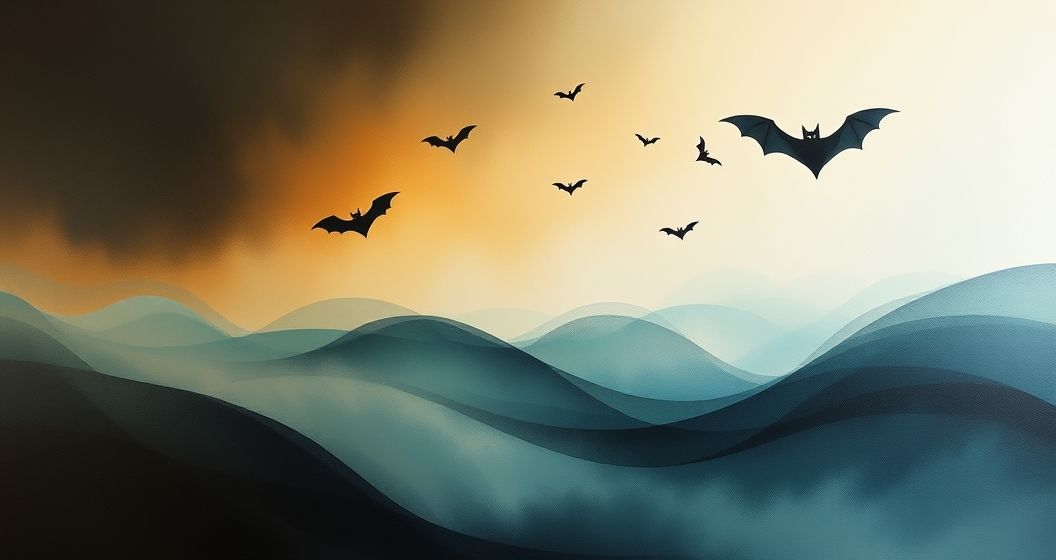Dreams of bats often arrive like silent messengers, carrying layers of meaning that resonate deep within our emotional landscape. Unlike more straightforward symbols like teeth falling out or flying, bats introduce a complex interplay of fear and intrigue, darkness and flight, making their interpretation both challenging and deeply personal. To understand these dreams, we must first recognize the bat as a multifaceted symbol—one that speaks to our relationship with the unknown, our capacity for adaptation, and the delicate balance between confronting shadows and embracing light. Whether you see a single bat, a swarm, or feel its wings brushing against you, the dream’s emotional tone and context will shape its message, inviting reflection on what parts of yourself might be emerging from the dark recesses of your mind.
Core Symbols
Bats thrive in the liminal space between night and day, embodying the paradox of darkness and flight. In Western folklore, they’ve long been tied to superstition and fear—vampiric associations, omens of misfortune, or symbols of hidden threats. Yet in many Eastern traditions, bats carry profound spiritual meaning: the Chinese character for bat (蝠, fú) sounds like the word for 'good fortune' (福, fú), making them a symbol of prosperity and longevity. This duality—the bat as both feared and revered—reflects the subconscious’s own duality: parts of ourselves we reject (the 'shadow') and those we fear to embrace (the 'light'). Their ability to navigate in complete darkness also speaks to intuition, perception beyond what we can see, and the courage to trust inner guidance when external clarity feels absent. A bat flying calmly might signal confidence in your path, while one darting erratically could mirror anxiety or uncertainty about life’s direction.
Psychology Lens
Want a More Personalized Interpretation?
Get your own AI-powered dream analysis tailored specifically to your dream
🔮Try Dream Analysis FreeFrom a psychological perspective, Sigmund Freud viewed dreams as the 'royal road to the unconscious,' where repressed desires and fears manifest symbolically. Bats, with their association with the night, often represent these repressed elements—fears of inadequacy, unspoken truths, or suppressed passions. Carl Jung, however, emphasized the shadow archetype, suggesting bats might symbolize the integration of shadow aspects rather than mere repression. In his view, confronting the bat in dreams is an invitation to acknowledge parts of yourself you’ve disowned, not as threats but as essential to wholeness. Neurobiologically, during REM sleep, the brain processes emotional memories, and bat dreams frequently surface during periods of significant emotional processing—perhaps after a loss, career shift, or identity crisis. The bat’s movement, whether erratic or graceful, may mirror how your mind is synthesizing conflicting feelings about control, vulnerability, and self-expression.
Life Triggers
The 'tides' in your dream prompt hint at emotional currents—external events or internal shifts that stir these nocturnal symbols. If you’re navigating uncertainty—a new job, relationship, or personal goal—bats may appear as a call to trust your intuition. Their ability to thrive in darkness suggests you’re learning to navigate ambiguity without clear visibility, and the dream urges you to embrace this liminal space rather than resist it. Conversely, if you’ve been avoiding difficult conversations or repressing emotions, the bat’s presence might signal these unacknowledged parts of yourself demanding attention. For example, a dream of a bat perched on your shoulder could reflect a need to listen to your inner voice more closely, while one chasing you might represent a fear of confronting a problem head-on. The key is to notice the emotional tone: Is the bat a source of fear, curiosity, or calm? This tells you which aspect of your life needs balancing.
What To Do Next
When a bat dream stirs, begin with short-term reflection: Jot down the details—was the bat flying, perched, or attacking? How did you feel (fearful, curious, at peace)? Ask yourself: What areas of my life feel 'dark' or uncertain right now? This reflection helps you map the dream’s connection to waking emotions. For medium-term experimentation, try trusting your intuition in small ways—take a creative risk, have an honest conversation, or pursue a hidden interest. Like bats navigating by echolocation, you’re practicing 'hearing' your inner guidance beyond surface logic. Long-term integration involves recognizing that balance isn’t static; it’s a dance between facing fears and embracing the unknown. Schedule regular moments for self-inquiry, and remember: the bat’s message isn’t to fear the dark but to learn from it.
FAQ
Q: What does it mean if I dream of bats attacking me?
A: Attack dreams often reflect internal conflict—overwhelming responsibilities, self-doubt, or resisting change. The 'attack' symbolizes parts of yourself you’re avoiding integrating, not literal danger. Ask: What part of me feels 'attacked' in waking life?
Q: Why do I keep dreaming about bats?
A: Recurring dreams suggest unresolved emotional themes. If bats appear repeatedly, consider if you’re avoiding self-exploration or need to develop greater intuition. Keep a dream journal to track patterns.
Q: Are bat dreams always negative?
A: No—they can represent wisdom, adaptability, or spiritual awakening. A peaceful bat flying might signify trust in your path, while darkness could signal uncertainty needing attention. Context and emotion matter most.
